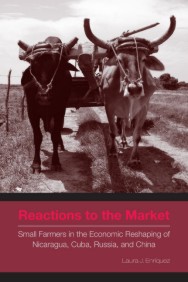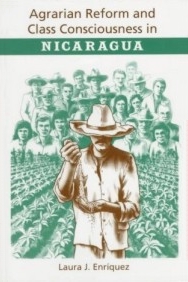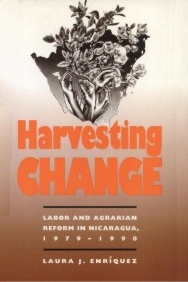Laura J. Enriquez
Laura Enríquez’s principal interest lies in the possibilities and dilemmas inherent in social transformation in Latin America. She has approached this interest through the lens of agriculture, whether in the shape of agrarian reform, food policy, or more general policies related to production in this sector of the economy and those who engage in it. More recently, her sociological lens has broadened to explore how the lack of such change has led to migration from the region to Europe. Her research sites have been Nicaragua, Cuba, Venezuela, and Italy, where she has engaged in interviewing and ethnography to study these topics.
Enríquez’s first two books were broadly concerned with the impact of the agrarian reform that was carried out in Nicaragua under the Sandinista government between 1979 and 1990. She looked at the effect it had on the economy as a whole, as well as the ways in which it influenced the political perspective of agrarian reform beneficiaries. In addition, she examined the shift in food policy in post-1990 Cuba, and the country's larger process of agrarian transformation, as its socialist government attempted to survive the collapse of its key trade partner - the Council for Mutual Economic Assistance.
Enríquez’s third book, Reactions to the Market: Small Farmers in the Economic Reshaping of Nicaragua, Cuba, Russia and China, brings her research on the first two of these countries together in an analysis of the different strategies that each government pursued in the post-1990 period to address their economic crises, and the impact these had on small farmers. Placing Nicaragua's and Cuba's small farmers in a comparative light with those of Russia and China, it argues that reform strategies implemented in each case reflected the overall political economic orientation of their respective governments: in Nicaragua and Russia, the emphasis was on bringing about a rapid retreat from socialism, and in Cuba and China (especially between 1978-1985), it was on reconfiguring socialism. The book situates this discussion at the intersection of the theoretical debates concerning "the transition to the market" that has taken place in former socialist countries - in particular the issue of whether that transition has led to more or less inequality - and the future of the peasantry with the expansion of capitalism in agriculture.
Trends in Latin American politics starting in the late 1990s opened the way for another project undertaken by Enríquez, which delves into the opportunities and challenges inherent in following the electoral path toward socialism. Her country of study has been Venezuela, where she has focused on the state and its implementation of agrarian reform, as well as its effort to transform agricultural production toward the achievement of food sovereignty.
Enríquez’s current project explores what happens when Latin Americans – most especially women – find themselves unable to improve their own and their family’s prospects in their home country. Aside from migrating within the region and northward to the U.S., a growing number of Latin Americans are migrating to Europe. Italy and Spain are the principal receiving countries there. This project examines the conditions that have led them to leave their home countries, how they are received when they arrive in Italy, and their on-going relationship with Latin America during their sojourn in Europe.
Some of her findings from this area of research are presented in Children of the Revolution: Violence, Inequality and Hope in Nicaraguan Migration, Enríquez’s most recent book. It examines this array of issues through oral histories with a small group of Nicaraguan women who are now living and working in Italy. Andrea, Silvia, Ana, and Pamela were impoverished youth when the Sandinista revolution took hold in Nicaragua in 1979. Against the backdrop of a war and economic crisis, the revolution gave them hope for a better future—if not for themselves, then for their children. But, when it became clear that their hopes were in vain, they chose to emigrate. The book tells these four women's stories through to their adulthood in Italy, highlighting the particularities of each woman's narrative, and showing how their lives were shaped by social factors such as their class, gender, race, ethnicity, and immigration status.
Enríquez, Laura J. 2022. Children of the Revolution: Violence, Inequality and Hope in Nicaraguan Migration. Stanford, CA: Stanford University Press.
Newman, Simeon J., and Laura J Enríquez. 2019 “Civil Society and the Transition Towards Socialism,” Comparative Sociology. doi:10.1163/15691330-12341501
Enríquez, Laura J., and Tiffany L. Page. 2018 “The Rise and Fall of the Pink Tide.” In The Routledge Handbook of Latin American Development, edited by Julie Cupples, Marcela Palomino-Schalscha, and Manuel Prieto Montt, pp. 87-97. London: Routledge.
Enríquez, Laura J. 2017. “Everyday Violence in Central America As Seen Through the Life of One Woman,” Qualitative Sociology, 40, 4 (December): 377-402; doi.org/10.1007/s11133-017-9366-7
Enríquez, Laura J., and Simeon J. Newman. 2016. “The Conflicted State and Agrarian Transformation in Pink Tide Venezuela,” Journal of Agrarian Change. 16, 4 (October): 594–626.
Enríquez, Laura J. 2013. “The Paradoxes of Latin America’s ‘Pink Tide’: Venezuela and Its Project of Agrarian Reform,” Journal of Peasant Studies 40, 4: 611-638.
 Enríquez, Laura J.
Enríquez, Laura J.
2010. Reactions to the Market: Small Farmers in the Economic Reshaping of Nicaragua, Cuba, Russia, and China. University Park, PA: Pennsylvania State University Press.
Enríquez, Laura J. 2010. “The Cuban Alternative to Neoliberalism: Linkages between Local Industry and Tourism After 1990,” International Journal of Development Issues 9,2.
Outstanding Paper Award Winner at the Literati Network Awards for Excellence 2011.
Enríquez, Laura J. 2003. “Economic Reform and Repeasantization in Post-1990 Cuba,” Latin American Research Review 38, 1: 202-218.
Enríquez, Laura J. 2000. “The Varying Impact of Structural Adjustment on Nicaragua’s Small Farmers,” European Review of Latin American and Caribbean Studies 69 (October): 47-68.
Enríquez, Laura J. 2000. “Cuba’s New Agricultural Revolution: The Transformation of Food Crop Production in Contemporary Cuba.” Development Report, Food First-Institute for Food and Development Policy.
Jonakin, Jon, and Laura J. Enríquez. 1999. "The Non-traditional Financial Sector in Nicaragua: A Response to Rural Credit Market Exclusion," Development Policy Review 17, 2 (June): 141-169.
Enríquez, Laura J. 1998. "Review of Neoliberalism and Class Conflict in Latin America: A Comparative Perspective on the Political Economy of Structural Adjustment, by Henry Veltmeyer, James Petras and Steve Vieux, in Contemporary Sociology 27, 5 (September): 523-524. Enríquez, Laura J.
Enríquez, Laura J.
1997. Agrarian Reform and Class Consciousness in Nicaragua. Gainesville, FL: University Press of Florida.
Enríquez, Laura J. 1994. The Question of Food Security in Cuban Socialism. Berkeley: Institute of International and Area Studies, University of California, Berkeley.
Enríquez, Laura J., and Marlen I. Llanes. 1993. "Back to the Land: The Political Dilemmas of Agrarian Reform in Nicaragua," Social Problems 40, 2 (May): 250-265.
Enríquez, Laura J. 1993. "La reforma agraria en Nicaragua: Su pasado y su futuro," in Carlos M. Vilas (Ed.), Centroamérica: Una Democracia Emergente. Mexico City: UNAM. Enríquez, Laura J.
Enríquez, Laura J.
1991. Harvesting Change: Labor and Agrarian Reform in Nicaragua, 1979-1990. Chapel Hill: University of North Carolina Press.
For complete list, see CV.